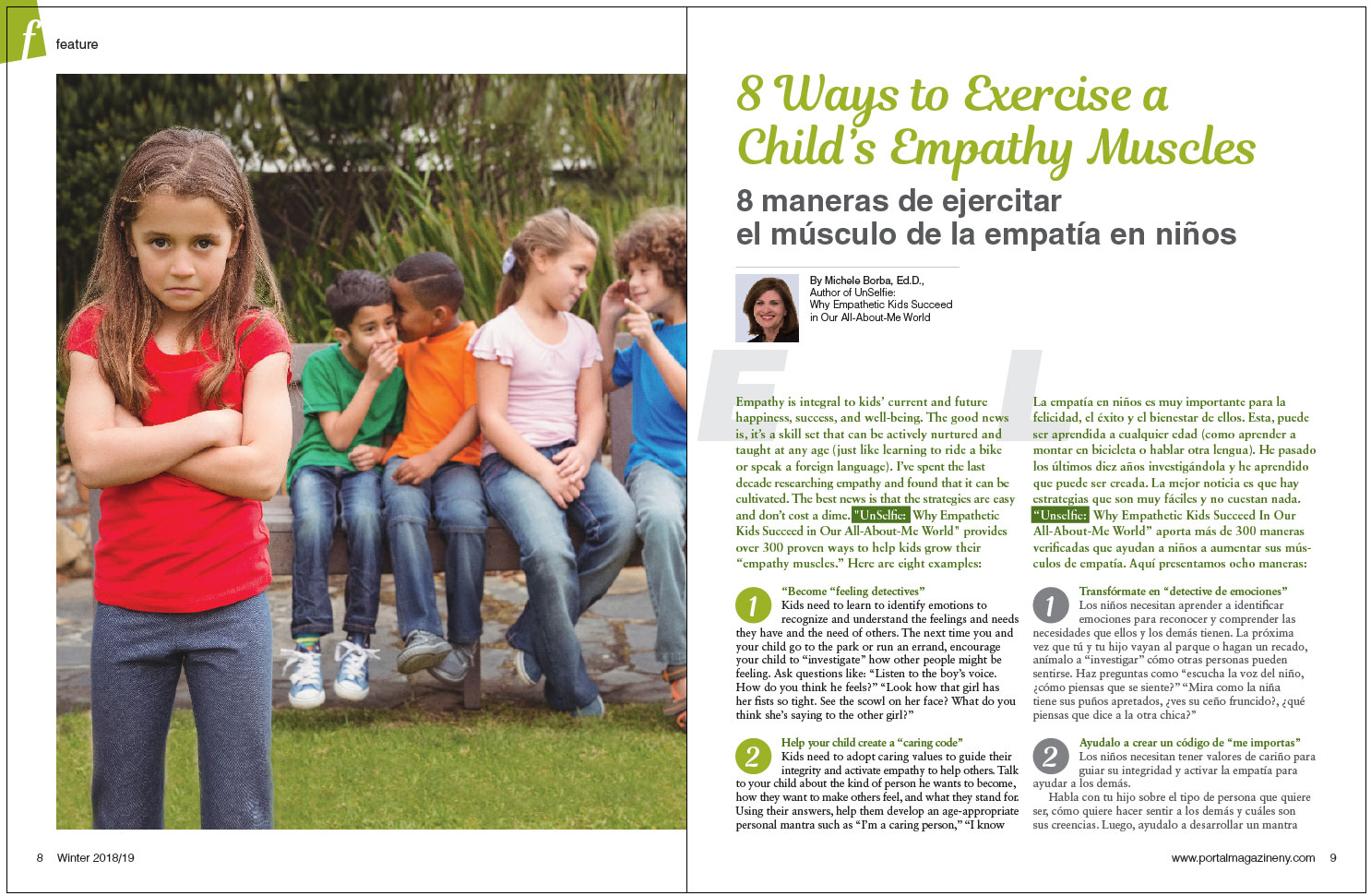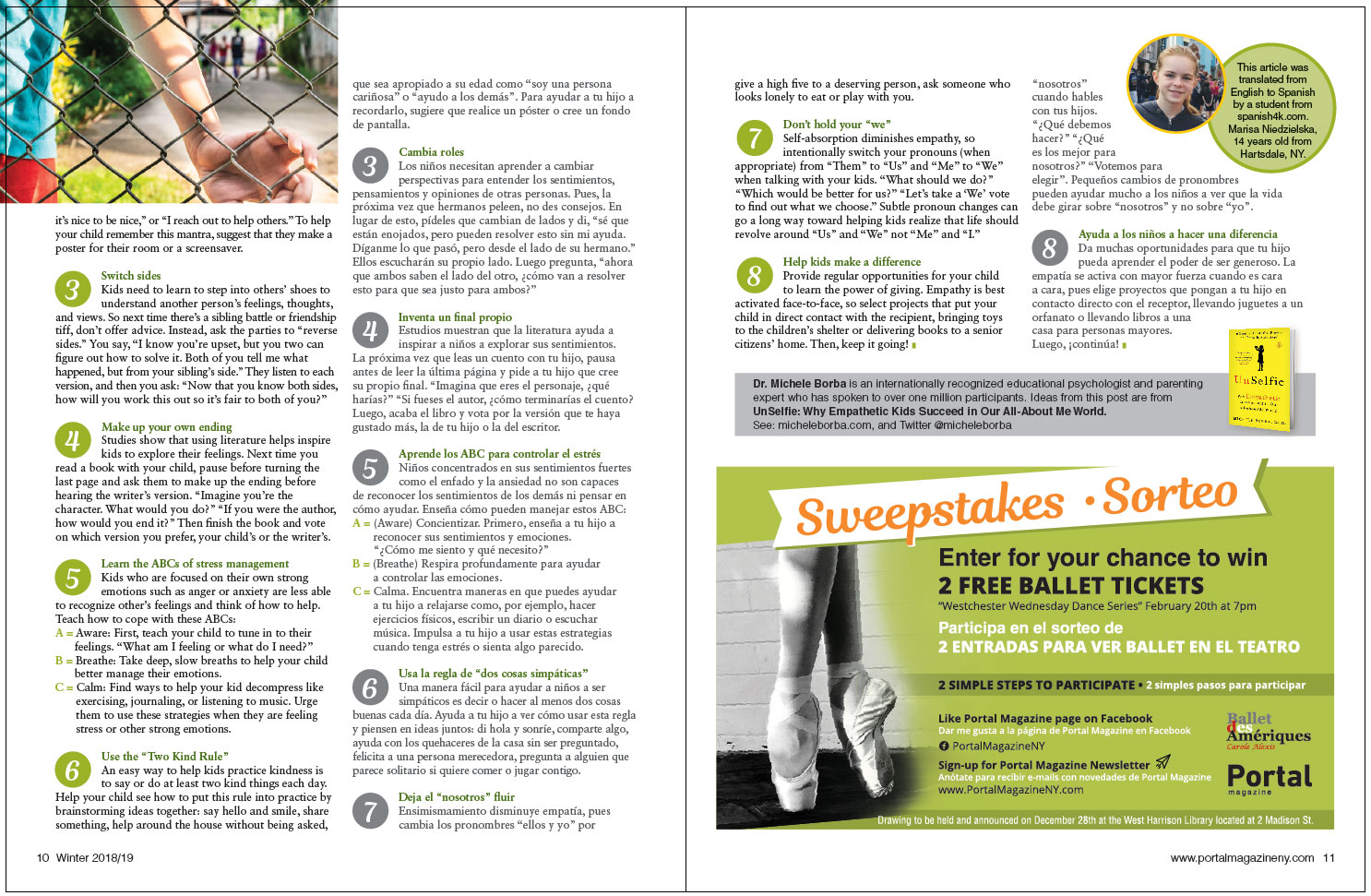8 Ways to Exercise a Child’s Empathy Muscles
By Michele Borba, Ed.D.,
Author of UnSelfie: Why Empathetic Kids Succeed in Our All-About-Me World
Empathy is integral to kids’ current and future happiness, success, and well-being. The good news is, it’s a skill set that can be actively nurtured and taught at any age (just like learning to ride a bike or speak a foreign language). I’ve spent the last decade researching empathy and found that it can be cultivated. The best news is that the strategies are easy and don’t cost a dime. “UnSelfie: Why Empathetic Kids Succeed in Our All-About-Me World” provides over 300 proven ways to help kids grow their “empathy muscles.” Here are eight examples:
1) “Become “feeling detectives”
Kids need to learn to identify emotions to recognize and understand the feelings and needs they have and the need of others. The next time you and your child go to the park or run an errand, encourage your child to “investigate” how other people might be feeling. Ask questions like: “Listen to the boy’s voice. How do you think he feels?” “Look how that girl has her fists so tight. See the scowl on her face? What do you think she’s saying to the other girl?”
2) Help your child create a “caring code”
Kids need to adopt caring values to guide their integrity and activate empathy to help others. Talk to your child about the kind of person he wants to become, how they want to make others feel, and what they stand for. Using their answers, help them develop an age-appropriate personal mantra such as “I’m a caring person,” “I know it’s nice to be nice,” or “I reach out to help others.” To help your child remember this mantra, suggest that they make a poster for their room or a screensaver.
3) Switch sides
Kids need to learn to step into others’ shoes to understand another person’s feelings, thoughts, and views. So next time there’s a sibling battle or friendship tiff, don’t offer advice. Instead, ask the parties to “reverse sides.” You say, “I know you’re upset, but you two can figure out how to solve it. Both of you tell me what happened, but from your sibling’s side.” They listen to each version, and then you ask: “Now that you know both sides, how will you work this out so it’s fair to both of you?”
4) Make up your own ending
Studies show that using literature helps inspire kids to explore their feelings. Next time you read a book with your child, pause before turning the last page and ask them to make up the ending before hearing the writer’s version. “Imagine you’re the character. What would you do?” “If you were the author, how would you end it?” Then finish the book and vote on which version you prefer, your child’s or the writer’s.
5) Learn the ABCs of stress management
Kids who are focused on their own strong emotions such as anger or anxiety are less able to recognize other’s feelings and think of how to help. Teach how to cope with these ABCs:
A = Aware: First, teach your child to tune in to their feelings. “What am I feeling or what do I need?”
B = Breathe: Take deep, slow breaths to help your child better manage their emotions.
C = Calm: Find ways to help your kid decompress like exercising, journaling, or listening to music. Urge them to use these strategies when they are feeling stress or other strong emotions.
6) Use the “Two Kind Rule”
An easy way to help kids practice kindness is to say or do at least two kind things each day. Help your child see how to put this rule into practice by brainstorming ideas together: say hello and smile, share something, help around the house without being asked, give a high five to a deserving person, ask someone who looks lonely to eat or play with you.
7) Don’t hold your “we”
Self-absorption diminishes empathy, so intentionally switch your pronouns (when appropriate) from “Them” to “Us” and “Me” to “We” when talking with your kids. “What should we do?” “Which would be better for us?” “Let’s take a ‘We’ vote to find out what we choose.” Subtle pronoun changes can go a long way toward helping kids realize that life should revolve around “Us” and “We” not “Me” and “I.”
8)Help kids make a difference
Provide regular opportunities for your child to learn the power of giving. Empathy is best activated face-to-face, so select projects that put your child in direct contact with the recipient, bringing toys to the children’s shelter or delivering books to a senior citizens’ home. Then, keep it going!
La empatía en niños es muy importante para la felicidad, el éxito y el bienestar de ellos. Esta, puede ser aprendida a cualquier edad (como aprender a montar en bicicleta o hablar otra lengua). He pasado los últimos diez años investigándola y he aprendido que puede ser creada. La mejor noticia es que hay estrategias que son muy fáciles y no cuestan nada. “Unselfie: Why Empathetic Kids Succeed In Our All-About-Me World” aporta más de 300 maneras verificadas que ayudan a niños a aumentar sus músculos de empatía. Aquí presentamos ocho maneras:
1) Transfórmate en “detective de emociones”
Los niños necesitan aprender a identificar emociones para reconocer y comprender las necesidades que ellos y los demás tienen. La próxima vez que tú y tu hijo vayan al parque o hagan un recado, anímalo a “investigar” cómo otras personas pueden sentirse. Haz preguntas como “escucha la voz del niño, ¿cómo piensas que se siente?” “Mira como la niña tiene sus puños apretados, ¿ves su ceño fruncido?, ¿qué piensas que dice a la otra chica?”
2) Ayudalo a crear un código de “me importas”
Los niños necesitan tener valores de cariño para guiar su integridad y activar la empatía para ayudar a los demás.
Habla con tu hijo sobre el tipo de persona que quiere ser, cómo quiere hacer sentir a los demás y cuáles son sus creencias. Luego, ayudalo a desarrollar un mantra que sea apropiado a su edad como “soy una persona cariñosa” o “ayudo a los demás”. Para ayudar a tu hijo a recordarlo, sugiere que realice un póster o cree un fondo de pantalla.
3) Cambia roles
Los niños necesitan aprender a cambiar perspectivas para entender los sentimientos, pensamientos y opiniones de otras personas. Pues, la próxima vez que hermanos peleen, no des consejos. En lugar de esto, pídeles que cambian de lados y di, “sé que están enojados, pero pueden resolver esto sin mi ayuda. Díganme lo que pasó, pero desde el lado de su hermano.” Ellos escucharán su propio lado. Luego pregunta, “ahora que ambos saben el lado del otro, ¿cómo van a resolver esto para que sea justo para ambos?”
4) Inventa un final propio
Estudios muestran que la literatura ayuda a inspirar a niños a explorar sus sentimientos. La próxima vez que leas un cuento con tu hijo, pausa antes de leer la última página y pide a tu hijo que cree su propio final. “Imagina que eres el personaje, ¿qué harías?” “Si fueses el autor, ¿cómo terminarías el cuento? Luego, acaba el libro y vota por la versión que te haya gustado más, la de tu hijo o la del escritor.
5) Aprende los ABC para controlar el estrés
Niños concentrados en sus sentimientos fuertes como el enfado y la ansiedad no son capaces de reconocer los sentimientos de los demás ni pensar en cómo ayudar. Enseña cómo pueden manejar estos ABC:
A = (Aware) Concientizar. Primero, enseña a tu hijo a reconocer sus sentimientos y emociones. “¿Cómo me siento y qué necesito?”
B = (Breathe) Respira profundamente para ayudar a controlar las emociones.
C = Calma. Encuentra maneras en que puedes ayudar a tu hijo a relajarse como, por ejemplo, hacer ejercicios físicos, escribir un diario o escuchar música. Impulsa a tu hijo a usar estas estrategias cuando tenga estrés o sienta algo parecido.
6) Usa la regla de “dos cosas simpáticas”
Una manera fácil para ayudar a niños a ser simpáticos es decir o hacer al menos dos cosas buenas cada día. Ayuda a tu hijo a ver cómo usar esta regla y piensen en ideas juntos: di hola y sonríe, comparte algo, ayuda con los quehaceres de la casa sin ser preguntado, felicita a una persona merecedora, pregunta a alguien que parece solitario si quiere comer o jugar contigo.
7) Deja el “nosotros” fluir
Ensimismamiento disminuye empatía, pues cambia los pronombres “ellos y yo” por “nosotros” cuando hables con tus hijos. “¿Qué debemos hacer?” “¿Qué es los mejor para nosotros?” “Votemos para elegir”. Pequeños cambios de pronombres pueden ayudar mucho a los niños a ver que la vida debe girar sobre “nosotros” y no sobre “yo”.
8) Ayuda a los niños a hacer una diferencia
Da muchas oportunidades para que tu hijo pueda aprender el poder de ser generoso. La empatía se activa con mayor fuerza cuando es cara a cara, pues elige proyectos que pongan a tu hijo en contacto directo con el receptor, llevando juguetes a un orfanato o llevando libros a una casa para personas mayores.
Luego, ¡continúa!







